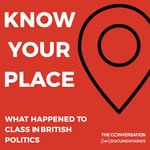Scam Factories | The Conversation Documentaries – Details, episodes & analysis
Podcast details
Technical and general information from the podcast's RSS feed.

Scam Factories | The Conversation Documentaries
The Conversation
Frequency: 1 episode/35d. Total Eps: 93

Hosted on Acast. See acast.com/privacy for more information.
Recent rankings
Latest chart positions across Apple Podcasts and Spotify rankings.
Apple Podcasts
🇫🇷 France - newsCommentary
14/07/2025#96🇫🇷 France - newsCommentary
13/07/2025#66🇬🇧 Great Britain - newsCommentary
11/07/2025#82🇬🇧 Great Britain - newsCommentary
10/07/2025#95🇩🇪 Germany - newsCommentary
29/06/2025#79🇬🇧 Great Britain - newsCommentary
28/06/2025#68🇩🇪 Germany - newsCommentary
28/06/2025#54🇬🇧 Great Britain - newsCommentary
25/06/2025#94🇬🇧 Great Britain - newsCommentary
22/06/2025#75🇬🇧 Great Britain - newsCommentary
19/06/2025#82
Spotify
No recent rankings available
Shared links between episodes and podcasts
Links found in episode descriptions and other podcasts that share them.
See allRSS feed quality and score
Technical evaluation of the podcast's RSS feed quality and structure.
See allScore global : 59%
Publication history
Monthly episode publishing history over the past years.
Theory of everything: do we really need one?
mercredi 12 avril 2023 • Duration 56:29
The quest for a theory of everything – explaining all the forces and particles in the universe – is arguably the holy grail of physics. While each of our main theories of physics works extraordinarily well, they also clash with each other. But do we really need a theory of everything? And are we anywhere near achieving one?
Featuring Vlatko Vedral, a professor of physics at the University of Oxford and Chanda Prescod-Weinstein, an assistant professor in physics and astronomy and core faculty in women's and gender studies at the University Of New Hampshire.
This episode is presented by Miriam Frankel and produced by Hannah Fisher. Executive producers are Jo Adetunji and Gemma Ware. Social media and platform production by Alice Mason, sound design by Eloise Stevens and music by Neeta Sarl. A transcript is available here. Sign up here for a free daily newsletter from The Conversation.
Further reading:
Hosted on Acast. See acast.com/privacy for more information.
Will we ever have a fundamental theory of life and consciousness?
mercredi 5 avril 2023 • Duration 46:45
What’s the difference between a living collection of matter, such as a tortoise, and an inanimate lump of it, such as a rock? They are, after all, both just made up of non-living atoms. The truth is, we don’t really know yet. Life seems to just somehow emerge from non-living parts.
Featuring Jim Al-Khalili, professor of physics at the University of Surrey, and Sara Imari Walker, professor of physics at Arizona State University.
This episode is presented by Miriam Frankel and produced by Hannah Fisher. Executive producers are Jo Adetunji and Gemma Ware. Social media and platform production by Alice Mason, sound design by Eloise Stevens and music by Neeta Sarl. A transcript is available here. Sign up here for a free daily newsletter from The Conversation.
Further reading:
Life: modern physics can’t explain it – but our new theory, which says time is fundamental, might
Hosted on Acast. See acast.com/privacy for more information.
Climate Fight part 5: the art and chaos of negotiating the Glasgow Climate Pact
vendredi 19 novembre 2021 • Duration 44:39
A good negotiation is supposed to leave everyone feeling a little unsatisfied. So what happened at the world's biggest one – over the future of our planet? In part five, and our final episode of Climate fight: the world’s biggest negotiations, host Jack Marley reports from Glasgow where he spoke to academics who have been researching the UN climate negotiations for decades, and the people representing their countries in the talks.
Featuring Abhinay Muthoo, professor of economics at the University of Warwick in the UK; François Gemenne, director of the Hugo Observatory at the University of Liège in Belgium, and Lisa Vanhala, professor of political science at UCL in the UK. And Hadeel Hisham Ikhmais, a climate negotiator from Palestine.
The Climate Fight podcast series is produced by Tiffany Cassidy. Sound design is by Eloise Stevens and our series theme tune is by Neeta Sarl. The series editor is Gemma Ware. You can sign up to The Conversation’s free daily email here. A transcript of this episode will be available soon.
Climate fight: the world’s biggest negotiation is a podcast series supported by UK Research and Innovation, the UK’s largest public funder of research and innovation.
Further reading
- Five things you need to know about the Glasgow Climate Pact, by Simon Lewis, UCL and Mark Maslin, UCL
- The world has made more progress on climate change than you might think – or might have predicted a decade ago, by Myles Allen, University of Oxford
- COP26 deal: how rich countries failed to meet their obligations to the rest of the world, by Lisa Vanhala, UCL
- Coal: why China and India aren’t the climate villains of COP26, by Daniel Parsons and Martin Taylor, University of Hull
Hosted on Acast. See acast.com/privacy for more information.
Climate Fight part 4: the youth movement grows up
mercredi 27 octobre 2021 • Duration 31:13
Locked out of conferences and company boardrooms, young people have tried to influence the international response to the climate crisis with strikes and protests. In part four of Climate Fight, the world's biggest negotiation, we explore what effect this youth activism has, and where the movement will go next.
Featuring Harriet Thew, researcher in climate change governance at the University of Leeds, who speaks to youth climate activist Abel Harvie-Clark about his experiences. And Lynda Dunlop, a senior lecturer in science education at the University of York.
The Climate Fight podcast series is produced by Tiffany Cassidy. Sound design is by Eloise Stevens and our series theme tune is by Neeta Sarl. The series editor is Gemma Ware. You can sign up to The Conversation’s free daily email here. A transcript of this episode is available here.
Climate fight: the world’s biggest negotiation is a podcast series supported by UK Research and Innovation, the UK’s largest public funder of research and innovation.
Further reading
- Environmental action: why some young people want an alternative to protests, by Lynda Dunlop, Lucy Atkinson and Maria Turkenburg-van Diepen, University of York
- Young climate activists have far more power than they realise, by Anna Pigott, Swansea University
- How the youth climate movement is influencing the green recovery from COVID-19 , by Jens Marquardt, Stockholm University
- Climate crisis: how states may be held responsible for impact on children, by Aoife Daly, University College Cork
Hosted on Acast. See acast.com/privacy for more information.
Climate fight part 3: the left behind
mercredi 20 octobre 2021 • Duration 36:37
In the shift away from fossil fuels, how do countries make sure not to widen inequalities in the process? In part three of our series Climate fight: the world’s biggest negotiations, we travel to the Cumbrian town of Whitehaven on England’s north-west coast that could soon host the UK’s first deep coal mine in more than three decades. We talk to local people for and against the mine, as well as experts in the concept of a just transition, to explore how regions like west Cumbria that have suffered from decades of deindustrialisation can thrive in the shift to a low-carbon economy.
Featuring Rebecca Ford, senior lecturer in politics at the University of Strathclyde, Rebecca Willis, professor in Practice at the Lancaster Environment Centre at Lancaster University and Kieran Harrahill, PhD candidate in bioeconomy at University College Dublin.
The Climate Fight podcast series is produced by Tiffany Cassidy. Sound design is by Eloise Stevens and our series theme tune is by Neeta Sarl. The series editor is Gemma Ware. You can sign up to The Conversation’s free daily email here. A transcript of this episode is available here.
Climate fight: the world’s biggest negotiation is a podcast series supported by UK Research and Innovation, the UK’s largest public funder of research and innovation.
Further reading
- Cumbria coal mine could usher in a net-zero-compliant fossil fuel industry – or prove it was always a fantasy, by Myles Allen, University of Oxford
- Ending coal use blighted Scottish communities – a just transition to a green economy must support workers, by Ewan Gibbs, University of Glasgow
- How to make climate action popular, by James Patterson, Utrecht University and Marie Claire Brisbois, University of Sussex
Hosted on Acast. See acast.com/privacy for more information.
Climate Fight part 2: the path to net zero
mercredi 13 octobre 2021 • Duration 38:43
In part two of Climate Fight: the world’s biggest negotiation, we’re talking to experts about the grand goal of the negotiations: reaching net zero emissions by 2050. We explore what net zero means, and the technologies that will be needed to get the world there.
Featuring Mercedes Maroto-Valer, assistant deputy principal for research & innovation and director of the Research Centre for Carbon Solutions at Heriot-Watt University, James Dyke, senior lecturer in global systems at the University of Exeter and Myles Allen, professor of geosystem science and director of Oxford Net Zero at the University of Oxford. Our producer Tiffany Cassidy also visits the Boundary Dam coal-fired power plant in Saskatchewan, Canada, to see carbon capture and storage technology in action.
The Climate Fight podcast series is produced by Tiffany Cassidy. Sound design is by Eloise Stevens and our series theme tune is by Neeta Sarl. The series editor is Gemma Ware. You can sign up to The Conversation’s free daily email here. A transcript of this episode is available here.
Climate fight: the world’s biggest negotiation is a podcast series supported by UK Research and Innovation, the UK’s largest public funder of research and innovation.
Further reading
- A global carbon removal industry is coming – experts explain the problems it must overcome, by Johanna Forster and Naomi Vaughan, University of East Anglia
- Climate crisis: what can trees really do for us?, by Rob MacKenzie University of Birmingham and Rose Pritchard, University of Manchester
- Climate scientists: concept of net zero is a dangerous trap , by James Dyke, University of Exeter; Robert Watson, University of East Anglia and Wolfgang Knorr, Lund University
- Net zero: despite the greenwash, it’s vital for tackling climate change, by Richard Black, Imperial College London; Steve Smith and Thomas Hale, University of Oxford
Hosted on Acast. See acast.com/privacy for more information.
Climate Fight part 1: where's the money?
mercredi 6 octobre 2021 • Duration 34:26
In the first episode of our new series Climate fight: the world's biggest negotiation, we're talking about climate finance – money pledged by the world's richest countries to help the poorest parts of the world adapt to and mitigate the effects of climate change. Where is it being spent and is it really working?
Featuring Jessica Omukuti, COP26 Fellow in Climate Finance at the University of York and a research fellow on inclusive net zero at the University of Oxford, Harpreet Kaur Paul, a PhD candidate in climate justice at the University of Warwick and Alina Averchenkova, distinguished policy fellow at the Grantham Research Institute on Climate Change, London School of Economics and Political Science. Thanks to the reporting of Maryam Charles, we also hear from two residents of Zanzibar about why some climate finance can leave people feeling worse off.
The Climate Fight podcast series is produced by Tiffany Cassidy with reporting from Maryam Charles in Zanzibar. Sound design is by Eloise Stevens and our series theme tune is by Neeta Sarl. The series editor is Gemma Ware. You can sign up to The Conversation’s free daily email here. A transcript of this episode is available here.
Climate fight: the world’s biggest negotiation is a podcast series supported by UK Research and Innovation, the UK’s largest public funder of research and innovation.
Further reading:
- Climate finance: rich countries aren’t meeting aid targets – could legal action force them? by Harpreet Kaur Paul, University of Warwick
- Climate adaptation finance is ineffective and must be more transparent, by Jessica Omukuti, University of York
- COP26: what’s the point of this year’s UN climate summit in Glasgow? by Federica Genovese, University of Essex and Patrick Bayer, University of Strathclyde
- Climate change: convincing people to pay to tackle it is hard – treating it like a pension could help by David Comerford, University of Stirling
Hosted on Acast. See acast.com/privacy for more information.
Climate fight: the world's biggest negotiation – trailer
mercredi 29 septembre 2021 • Duration 02:13
How will we actually tackle the climate crisis? And who gets to decide? As Glasgow gets ready to hold the COP26 climate summit in November, The Anthill Podcast is launching Climate fight: the world's biggest negotiation, a new podcast series taking you inside the fight for our planet's future.
We'll speak to some of the academic experts influencing climate policy, and to some of the people around the world who will see their lives change as a result of it. We'll also be in Glasgow for the COP26 summit, talking to experts to unpack how the negotiations went. The first episode will go live on October 6.
The Climate Fight podcast series is produced by Tiffany Cassidy. Sound design is by Eloise Stevens and our series theme tune by Neeta Sarl. The series editor is Gemma Ware. You can sign up to The Conversation’s free daily email here.
Climate fight: the world’s biggest negotiation is a podcast series supported by UK Research and Innovation, the UK’s largest public funder of research and innovation.
Hosted on Acast. See acast.com/privacy for more information.
Recovery part six – 2008 financial crisis and lessons for today
mercredi 8 juillet 2020 • Duration 42:16
The 2008 financial crisis resulted in the worst global recession since the second world war. The collapse of US investment bank Lehman Brothers in September 2008 caused a meltdown of the global financial system. Money markets froze and there was a major credit crunch as the ability to borrow money suddenly dried up.
To stop contagion and make sure other major financial institutions didn’t collapse, governments stepped in to shore up the system by bailing out the banks. Anastasia Nesvetailova, professor of international political economy at City, University of London, explains what these bailouts involved and why they were so necessary.
Aidan Regan, associate professor at University College Dublin, tells us how the crisis spread across the eurozone and why some countries rebounded a lot more quickly than others. We also discuss how the austerity policies that many governments adopted following the 2008 financial crisis hampered economic growth.
And we explore how emerging markets such as Brazil and China were affected by the 2008 financial crisis. Carolina Alves, fellow in economics at the University of Cambridge, outlines how they were shielded from some elements of the crisis but also left vulnerable to the large reduction in finance that followed.
You can read more research into the 2008 financial crisis and what lessons we can learn from it for today's coronavirus recovery alongside other articles in our Recovery series, which accompany this podcast.
This episode was produced by Gemma Ware and Annabel Bligh, with sound design by Eloise Stevens.
The Anthill is a podcast from The Conversation UK. We’re an independent news media outlet that exists purely to take reliable, informed voices direct to a wide audience. If you’re able to to support our work, please consider donating via our website. Thanks to everyone who has already done so.
Hosted on Acast. See acast.com/privacy for more information.
Recovery part five – the post-Soviet transition
mercredi 1 juillet 2020 • Duration 36:38
In this fifth episode of Recovery, a series from The Anthill Podcast exploring key moments in history when parts of the world recovered from a major crisis or shock, we’re looking at what happened in the former Soviet Union during the transition from communism to capitalism in the 1990s.
When the USSR was finally dissolved at the end of 1991 it was a massive shock to the system for millions of people. The transition from a state-controlled command economy to a market-driven capitalist one was a hugely complex structural change. What followed was what’s come to be known as “shock therapy” – post-communist states were suddenly subject to mass privatisation and market reforms. Price controls were lifted. State support – which had been such a fundamental part of everybody’s way of life in the former Soviet Union and eastern bloc – was withdrawn.
Jo Crotty, professor of management and director of the Institute for Social Responsibility at Edge Hill University, was living in between Belarus and Russia in the early 1990s. She describes the hyperinflation and economic breakdown she witnessed during this period. Companies tried to keep people employed, but these were jobs in name only and there was a huge problem of hidden unemployment – which she says offers a warning as coronavirus furlough schemes end today.
Some parts of the former Soviet Union and Eastern bloc countries recovered quicker than others. Lawrence King, professor of economics at the University of Massachusetts, Amherst and a research associate at Cambridge University’s Judge Business School, explains why, and what political upheaval the drastic economic reforms provoked. He also describes the devastating impact that waves of privatisation had on mortality rates in Russia in the 1990s.
And Elisabeth Schimpfössl, lecturer in sociology and policy at Aston University, talks about a new group of oligarchs emerged in Russia during the transition in the 1990s, benefitting from the waves of privatisation and shift to a capitalist system. She describes the enduring legacy this period has had on wealth inequality in Russia.
You can read more about the post-Soviet transition and its legacy alongside other articles in our Recovery series accompanying this podcast.
This episode was produced by Gemma Ware and Annabel Bligh with sound design by Eloise Stevens.
The Anthill is produced by The Conversation UK. We’re an independent news media outlet that exists purely to take reliable, informed voices direct to a wide audience. We’re a charity, with no wealthy owner nudging an editorial line in one direction or another. The only opinion we hold is that knowledge is crucially important, and must be made widely available to help as many people as possible understand the world and make informed decisions. If you can help us do what we do, please click here to donate. And if you’ve already supported what we do, thank you!
Hosted on Acast. See acast.com/privacy for more information.









